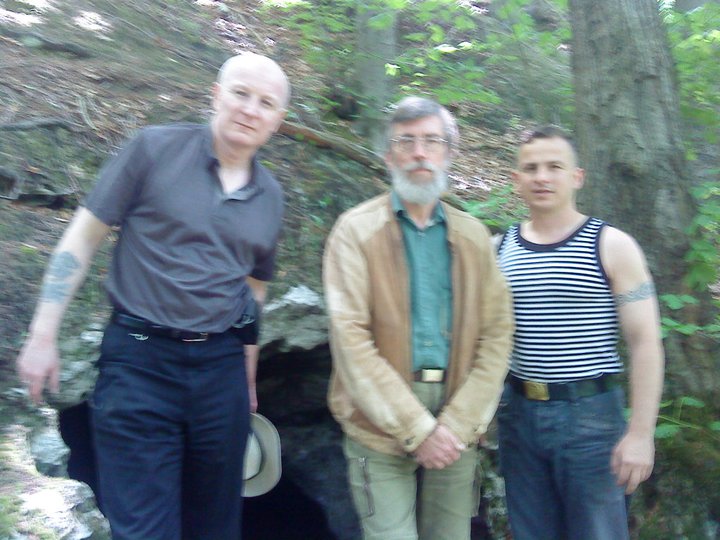Ian Read & Rolf Schilling
How I met a Remarkable Man

Uwe Nolte, who is no mean poet himself, had told me of someone he had become acquainted with who was a great poet. Excellence in any field is certainly not the norm in these benighted times and I have expended much effort meeting such men in my life. Thus, I was keen to meet Mr Rolf Schilling, and Uwe made this happen during one of my trips to Middle Germany to perform with my band Fire + Ice. During our discussions, previous to my meeting Mr Schilling, I had expressed an interest in putting one of his poems to music, and Uwe had mentioned this to him.
On the appointed day Mr Schilling guided us to a pothole situated in the mountains and a small group of us, all Germans with the exception of me, descended it. Beforehand, Mr Schilling ordered us to respect the spirits of the place by foregoing the photography which is usual amongst tourists. I suspect he knew that this select group were aware that such an intrusion would be unacceptable in such a sacred place, but “safe is safe,” as we English say. One thing is for sure, few would know of this place because it was somewhat off the beaten track and certainly not the easiest descent I have ever made, consisting of many points that were wet and slippery right next to a drop of a distance one would not want to fall down. That being said, Mr Schilling, who is a few years my senior, went racing ahead like a ferret down a hole. OK, he had made the descent many times before, but it was, nevertheless, an impressive demonstration of the rage against age, and another factor that raised him in my estimation. Gaining the bottom, we all realised what a great privilege he had gifted us all, and that is all I may say on this; the eldritch realms being places one had best experience for oneself.
At some time Mr Schilling spoke to me in perfect English, something I was most impressed with, bearing in mind that those who grew up in the former Eastern Bloc are more likely to have a facility with Russian than English, and that the older generation were not taught English in school in the way that is so common nowadays. Later I discovered that he could write poems in perfect English, something that beggars belief, and is as rare as hen’s teeth actually. At my request he gracefully acceded to continue our conversation in German, and what a conversation that turned out to be; to call him a polymath hardly does justice to his breadth and depth of knowledge.
Later that day Mr Schilling prepared a barbeque at his house for us all and, to repay his hospitality, we all chipped in and went off to purchase the one item, apart from good company that such events demand, namely beer. Those who know me know that, when required, I can talk the hind leg off a donkey. However, this was not such a moment, and I had little to say, preferring to pay attention to any words of wisdom Mr Schilling might drop into the conversation. I did, however, early on in the evening, once I had got the measure of our host, express an interest in hearing some of his poetry. He replied by saying words to effect that he couldn’t bring anything to mind right then. OK, I thought, he too wants to get the measure of this Englishman, and who could blame him for that?
Near the end of our evening and quite suddenly, Mr Schilling announced that he would honour us with some readings of his work. Now, to me, the only point of a book of poetry is so one can read it out loud, reading it in one’s head just doesn’t cut it. And hearing it from the master is another experience entirely, and anyone failing to be deeply moved on this occasion (there were none I fain to believe,) would have had to have had less sense than a block of wood.
Finally, this wonderful and memorable evening drew to a close, and Mr Schilling and I said our goodbyes. Just before I finally stepped away, he said to me, “I would be pleased if you would make a song out of one of my poems.” Happy as Larry, on my return to England, I began to work on „Nimm, was dir die Götter geben“, and now it is one of the popular numbers I am glad to perform anywhere but, for obvious reasons, especially in Germany.
In case you are wondering why I have referred to Rolf Schilling as Mr Schilling throughout the text, it is because, despite nearly four decades speaking German, I am, like many Englishman I guess, not entirely sure when one might change from the formal to the informal form of address, without express permission from the other part to do so, even though, Mr Schilling at our last meeting did call me Ian. He is, after all, my elder, and manners maketh man after all.
Ian Read